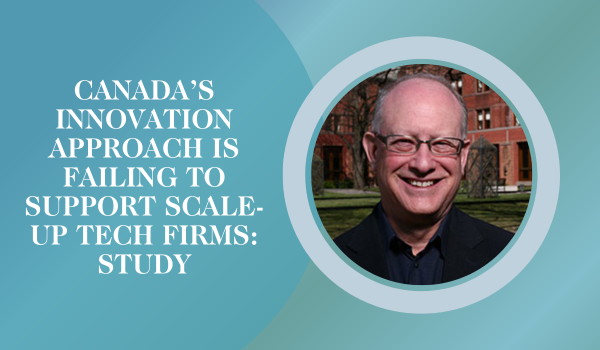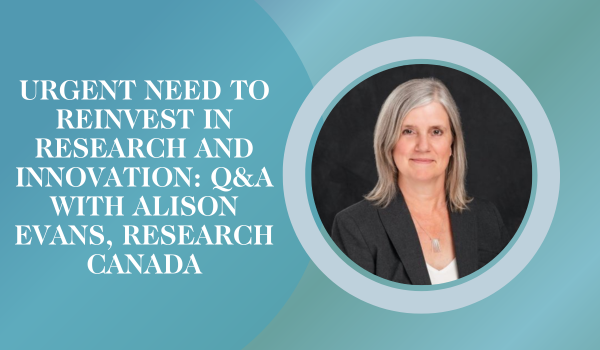Women scientists struggle with academia’s structural barriers and family caregiving
Time is something women scientists in academia don’t get enough of – along with respect, equitable treatment and a sense of belonging.
Researchers who are women – especially mothers and caregivers – continue to struggle with the constant demands and structural biases found in post-secondary institutions, three university scientists said during a CIFAR talk on February 28.
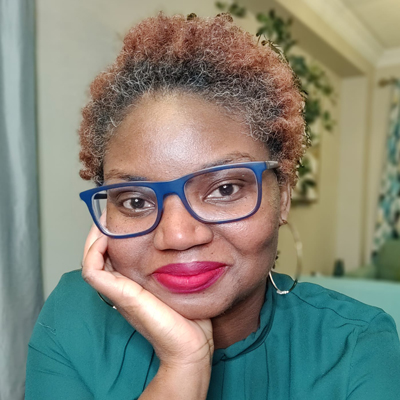 “I have struggled with belonging in academia and feeling like I need to justify my presence and my merit,” said Grace Adeniyi-Ogunyankin (photo at right) fellow in CIFAR’s Humanity’s Urban Future program and an associate professor of geography and planning, and gender studies, at Queen’s University. Born in Nigeria, her current research looks at how the African urban future is portrayed in popular culture and imagined by urban dwellers, politicians and policymakers.
“I have struggled with belonging in academia and feeling like I need to justify my presence and my merit,” said Grace Adeniyi-Ogunyankin (photo at right) fellow in CIFAR’s Humanity’s Urban Future program and an associate professor of geography and planning, and gender studies, at Queen’s University. Born in Nigeria, her current research looks at how the African urban future is portrayed in popular culture and imagined by urban dwellers, politicians and policymakers.
She recalled one first day of classes seeing some students confused by her presence in front of the class because they assumed she was a fellow student. “I think this had to do with the lack of imagination that the professor of the classroom could be a woman, and Black and apparently young.”
The typical professor in a North American university classroom is white, male and well-established, Adeniyi-Ogunyankin said. “I am often presumed incompetent whereas studies show that most male professors are by default presumed competent.”
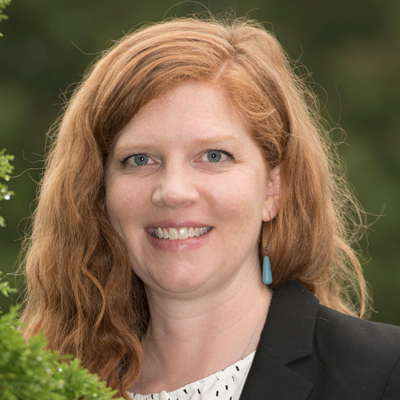 Trying to balance the demands of academia – not just publishing research and teaching, but also numerous service commitments – with being a caregiver to young children doesn’t leave much time to do research, said biologist and microbiome scientist Jessica Metcalf (photo at left), CIFAR Azrieli Global Scholar in the Humans & the Microbiome program and an associate professor of animal sciences at Colorado State University.
Trying to balance the demands of academia – not just publishing research and teaching, but also numerous service commitments – with being a caregiver to young children doesn’t leave much time to do research, said biologist and microbiome scientist Jessica Metcalf (photo at left), CIFAR Azrieli Global Scholar in the Humans & the Microbiome program and an associate professor of animal sciences at Colorado State University.
“If I can actually get 40 hours of work done in a week, that’s an amazing week,” she said.
In addition to being a parent and a caregiver, Metcalf is also a widow who has faced many challenges outside of academia. “I also went through a pretty intense in-vitro fertilization journey. In 2019, I had my daughter and my husband also died of cancer. And then we got hit with COVID-19.”
When it comes to institutional barriers, she pointed out that the college of agriculture where she works has never had a woman dean (although it currently has an interim woman dean) and her department has never had a woman department head. Yet the college’s undergraduate population is more than 90 per cent women.
“There are structural biases in how academic institutions are run and who they favour,” Metcalf said.
.jpg) The bias against women and minority groups happens not only in academic, but also in industry research laboratories, said Doina Precup (photo at left), Canada CIFAR AI Chair at Mila - Quebec AI Institute, fellow in CIFAR’s Learning in Machines & Brains program, and an associate professor of computer science at McGill University.
The bias against women and minority groups happens not only in academic, but also in industry research laboratories, said Doina Precup (photo at left), Canada CIFAR AI Chair at Mila - Quebec AI Institute, fellow in CIFAR’s Learning in Machines & Brains program, and an associate professor of computer science at McGill University.
For women in leadership positions, she said, “You don’t hear the questions because people try to be polite. But you feel that there’s always perhaps a question mark about your ability to manage a larger group or to manage a large project.”
In academia, she said, if there are one or two women or racialized persons in a department of 30 or 40 people, and somebody is required to be on the many service committees, a lot of this service work will end up being placed on the minority population.
“Because we have a finite amount of time, and because there’s a lot of other pressures including caregiving pressures, we end up with not enough time for research or teaching or all these other things that are actually more conducive to advancing one’s career,” Precup said.
Barriers to women scientists’ advancement
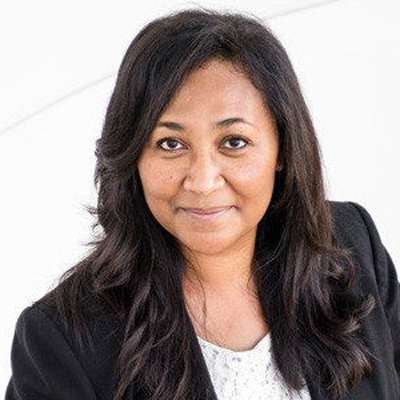 Women represent just 30 per cent of the world’s researchers according to UNESCO, said CIFAR talk moderator Chonnettia Jones (photo at right), a director on CIFAR’s board and president and executive director of Addgene, a non-profit plasmid information repository.
Women represent just 30 per cent of the world’s researchers according to UNESCO, said CIFAR talk moderator Chonnettia Jones (photo at right), a director on CIFAR’s board and president and executive director of Addgene, a non-profit plasmid information repository.
Research by France-based Mothers in Science has identified multiple structural barriers to the career advancement of mothers studying or working in the STEMM (science, technology, mathematics, medicine) sector, including:
- alarming levels of maternity bias and discrimination
- workplace exclusion and fewer professional opportunities
- widespread parental leave stigma
- lack of support and professional isolation.
Precup said one of the barriers to women scientists and racialized groups is that research “is very much a numbers game,” with an expected ideal in every field in terms of research papers published, number of students graduated, and amount of research grant money obtained.
“It makes it hard for people who have sometimes just a different research area – maybe more multidisciplinary. Or for people who have non-traditional backgrounds and come at research maybe late [in their career] or from a different angle,” she said.
In addition to assessing traditional metrics for scientific merit, academic institutions need to understand that science needs the perspectives from a diversity of people, “and what they can contribute beyond their citations and their papers,” Precup said. Institutions also need to provide the flexibility to offer caregiver programs and to accommodate different work styles and schedules, she added.
Adeniyi-Ogunyankin said that with the demands for high-level productivity and service in academia, she sometimes struggles “to prove worthy in a competitive environment and keep up, while also being a primary caregiver to young children.”
Some studies have documented how the institution favours the “care-less” worker, she said. As a result, some women scientists develop a range of coping strategies to try to keep up with institutional demands. “Many of which include simply falling in line with these demands and working more and sleeping less.”
The approach taken by some institutions to the challenges women scientists face is a form of blaming the victim and individualizing the problem, rather than recognizing it as a structural problem with the institutions, Adeniyi-Ogunyankin said.
Another challenge for researchers who are women and mothers is being able to travel to do fieldwork or attend conferences and other professional networking events.
Summer is when most researchers do their research, Adeniyi-Ogunyankin noted. However, as a mother with young children including a three-year-old, she’s wrestling with the need to travel this summer to do her research fieldwork in West Africa versus not spending that time with her children. She gave kudos to a CIFAR program that covers child care costs for children who are 12 and under whenever she needs to attend CIFAR program meetings.
Taking action to fix the problems
The three researchers who participated in the CIFAR talk didn’t just point out the problems women scientists face; each of them has taken action to try to address the situation and find solutions.
Adeniyi-Ogunyankin is a member of CIFAR’s Research, Equity & Inclusion Ambassador’s Community (REDIAC). REDIAC’s mandate – which includes an action plan – is to support the advancement of equity, diversity and inclusion in CIFAR’s research community, she said. “I want to be able to bring in my background, as a feminist and as someone who is committed to anti-racism, anti-colonial scholarship and also someone who’s engaging in challenging coloniality.”
Some institutions are taking positive actions such as targeted recruitment programs, increasing equitable and inclusive access to research grant opportunities, and extending early-career researcher status (and the opportunities for grants) for women who’ve given birth, Adeniyi-Ogunyankin said.
However, she said institutions need more political will and action to end “adjunctification,” where women and equity-deserving academics are over-represented as contingent faculty but they should be hired into fulltime positions. “We need to change the way people think about equity and merit.”
Precup, who directs the Montreal-based research team at Google Deepmind, is a co-founder of the AI for Good Lab, a seven-week machine learning training program for women and gender-diverse people. The program is supported by CIFAR and operated by Mila, with satellite labs at all three of Canada’s national AI institutes.
In creating the AI for Good Lab, “we wanted to address the gender gap in AI and machine learning, which is unfortunately growing, not shrinking,” Precup said. “We wanted women to have a community.”
She added that part of the reason she has done well in her career is that she had mentors and sponsors at every step of the way. “I think it’s tremendously important to have that kind of relationship, and also to have each other to lean on when life is hard, when there are difficulties, when you [feel like you] want to switch careers.”
Metcalf is co-chair of her faculty’s Council for Gender Quality, which makes recommendations to Colorado State University’s president and provost. The Council’s work includes improving parental leave, providing child care access related to planning research, and a pilot program to financially support temporary care-giving for parents who want to do research that requires travel.
However, academic institutions shouldn’t be relying on women scientists who already don’t have enough time to do their research to volunteer to try to fix some of the complex problems women scientists face, Metcalf said. “We really need our institutions to prioritize these issues and hire the right types of people with the right expertise to fix them.”
Metcalf also is a founding member of 500 Women Scientists, a Colorado-based grassroots organization that speaks up for science and for marginalized communities in science, and advocates building an inclusive scientific community. Among the group’s many activities is its Fellowship for the Future program, which provides fellowships for women of colour.
“The overall goal here is we want women to strive, not just survive, in science,” Metcalf said.
All three CIFAR-funded scientists agreed that support from women academic colleagues as well as men is very important for women scientists grappling with the sometimes overwhelming demands of being researchers, teachers, mothers and caregivers.
“I do have some male colleagues who get it. But in order to get it, they first have to recognize their privilege,” Adeniyi-Ogunyankin said. “The ones who don’t get it are the ones I have issues with. They’re the ones who won’t look at me, or they’re the ones who think I’m just there because I’m an affirmative action hire.”
Metcalf suggested that women scientists also need to go easier on themselves about how much they want to accomplish, given the institutional barriers they face and the constant demands on their time and energy. “Sometimes you’re ahead of the game and sometimes you’re just barely pulling it off, and that’s okay. You just got to do what you can do.”
R$
Events For Leaders in
Science, Tech, Innovation, and Policy
Discuss and learn from those in the know at our virtual and in-person events.
See Upcoming Events
You have 0 free articles remaining.
Don't miss out - start your free trial today.
Start your FREE trial Already a member? Log in
By using this website, you agree to our use of cookies. We use cookies to provide you with a great experience and to help our website run effectively in accordance with our Privacy Policy and Terms of Service.


